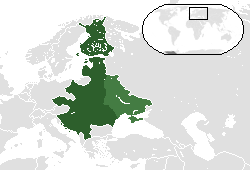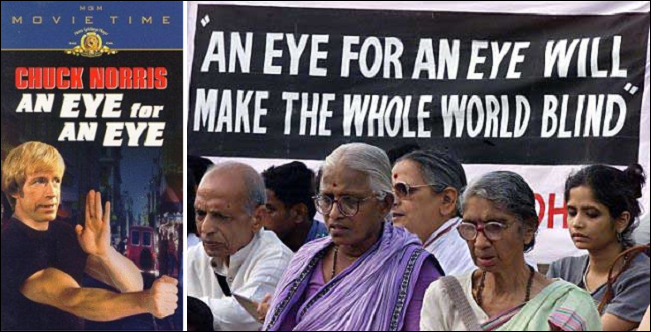Pole position
Wednesday, March 5th, 2014[exhumed by Lynn C. Rees]

If a man continually blusters, if he lacks civility, a big stick will not save him from trouble but neither will speaking softly avail, if back of the softness there does not lie strength, power.
– Theodore Roosevelt
One of the great strategic failures of the twentieth century was the failure to strangle Bolshevism in its cradle. For France and Britain, the failure arose from a desire to reconstitute the Russian Empire as it was before World War I with White armies, general war weariness by their populations after four years of bloody war, and a belief that no one as crazy as the Bolsheviks could endure in power. Winston Churchill warned of danger ahead but, as he was through most of his career, he was a prophet without honor in his own country on a good day and a stereotypical aristocratic English crank on a bad day. France and Britain would suffer a century of war, loss of their preeminence, and the fundamental corruption of their liberal institutions as a result.
The motives of the United States, new to this world power thing, were weakly held at worst and ambivalently held at best. They intervened in Russia primarily for reasons of Allied/“Associated Power” solidarity, to rescue a large army raised from former Austro-Hungarian Czech POWs that needed to be shipped to the Western Front, to seize Allied arms provided to the Imperial Russian government before the February Revolution, and to protect American property. Much to the chagrin of Allied commanders, American soldiers largely focused on that mission and not on the cause of supporting Russians fighting the Bolsheviks. Stopping a Red Menace in Russia that would threaten the U.S. after 1945 was not on the American agenda. Coming home was.
Poland did not have such a luxury. For Poland, Russia was all to close. Much as they would have wished the Atlantic to shift eastwards and separate Poland from Russia, Jozef Pilsudski, the father of Polish independence, had to have a strategy to counter a Russian empire that was right next door. The curious thing: he developed and started executing his strategy before Poland was even a state.
Pilsudski was born in Lithuania, then part of the Russian Empire. His family was minor nobility who’d risen and fought against Russia during Poland’s habitual escape attempts from the Prison of Nations. In school, Pilsudski was subjected to Russification but only learned to hate Russia, the Czar, Russian Orthodoxy, the Russian language, and Russian culture. He went to medical school but soon involved himself in pro-Polish independence movements. As with many, this led to arrest and a Siberian vacation. He was later released, returned to Poland, took up agitation again, and was imprisoned again. Pilsudski escaped (escape from Russian prisons was surprisingly common for revolutionaries like Pilsudski, Dzerzhinsky, and Stalin) and went into exile.
It was here that Pilsudski proposed the first version of his Promethean strategy to the Japanese after their war with Russia War broke out:
Poland’s strength and importance among the constituent parts of the Russian state embolden us to set ourselves the political goal of breaking up the Russian state into its main constituents and emancipating the countries that have been forcibly incorporated into that empire. We regard this not only as the fulfillment of our country’s cultural strivings for independent existence, but also as a guarantee of that existence, since a Russia divested of her conquests will be sufficiently weakened that she will cease to be a formidable and dangerous neighbor.
Pilsudski was proposing a grand strategy that echoed French strategy from Richelieu down to the bumbling Luigi Nabulione Buonaparte: keep a large neighboring proto-nation, in France’s case Germany, from being united under a state whose combined strength would constitute a mortal threat. Britain followed a similar strategy by keeping Europe divided by supporting whoever ganged up against the latest aspiring continental hegemon. In Pilsudski’s scheming, Russia, the Prison of Nations, was to be permanently checked by opening the prison’s locks and letting the prisoners out.
Japan, aiming to disrupt rather than destroy, provided Pilsudski with just enough resources to create distractions for Russia during the 1905 Russian Revolution but not enough to gain independence. Stymied, Pilsudski removed to Austrian Poland and sat down to an intricate game. Foreseeing a general European War, Pilsudski, with Austrian connivance, started building up a Polish Legion. Officers and NCOs were trained, agents were sent into Poland to assassinate Russian officials and steal money, and troops were trained under the fiction of setting up sporting clubs and a Rifleman’s Association. When World War I broke out, Pilsudski led 12,000 paramilitaries. At a meeting in Paris in 1914:
Pisudski presciently declared that in the impending war, for Poland to regain independence, Russia must be beaten by the Central Powers (the Austro-Hungarian and German Empires), and the latter powers must in their turn be beaten by France, Britain and the United States.
Pilsudski formed an official Polish Legion to fight for Austria-Hungary against Russia while secretly informing the British that his forces would only fight Russia, not Britain and France. Pilsudski gained military experience by leading his forces in several battles with the Russians on the Eastern Front. After one encounter in which the Polish Legion suffered heavy casualties in successfully defending against a Russian attack, Pilsudski was able to coax the Germans and Austrians into declaring Poland independent. Under the new Polish government established by the Central Powers, Pilsudski served as minister of war but increasingly took an independent position as the war drew to an end. After refusing to permit the Polish Legion to swear allegiance to Germany and Austria, Pilsudski was imprisoned by the Germans, the Polish Legion disbanded, and its men incorporated into the Austrian army. But, as Germany approached Armistice Day, they decided to create mischief. They released Pilsudski from prison and sent him back to Poland in a sealed train (like Lenin).
On Armistice Day 1918, Poland declared her independence. Pilsudski eased German troops from Poland (usefully leaving their weapons behind) and, as head of state, began organizing Poland as an independent state with its own government and army. The other leg of his strategy was revealed at this time: Intermarum. Pilsudski sought to create:
[A] federation, under Poland‘s aegis, of Central and Eastern European countries. Invited to join the proposed federation were the Baltic states (Lithuania, Latvia, Estonia), Finland, Belarus, Ukraine, Hungary, Romania, Yugoslavia and Czechoslovakia.

This federation would be an explicit counter to Germany and a rump Russia and an implicit counter to Britain and France. Curiously, in reference to the future, it would have been a kind of positive Warsaw Pact. Unfortunately for Pilsudski’s scheme, Britain and France opposed such a creature and Poland’s neighbors were too distrustful of Poland and too antagonistic towards each other to make such a pact.
Facing the immediate impracticability of Intermarum, Pilsudski shifted to Prometheism. Observing that “All that we can gain in the west depends on the Entente—on the extent to which it may wish to squeeze Germany”, while in the east “there are doors that open and close, and it depends on who forces them open and how far.” So Pilsudski focused on extending Poland’s eastern frontier.
This is where two of Pilsudski’s actions had a massive effect on the future of the world. When examining the situation in Russia, Pilsudski had a problem:
Pilsudski was aware that the Bolsheviks were no friends of independent Poland, and that war with them was inevitable. He viewed their advance west as a major problem, but also considered the Bolsheviks less dangerous for Poland than their Russian Civil War opponents. These “White Russians”—representative of the old Russian Empire—were willing to accept only limited independence for Poland, probably within borders similar to those of the former Congress Poland, and clearly objected to Polish control of Ukraine, which was crucial for Pilsudski’s Intermarum project.
This was in contrast to the Bolsheviks, who proclaimed the partitions of Poland null and void.Pilsudski thus speculated that Poland would be better off with the Bolsheviks, alienated from the Western powers, than with a restored Russian Empire [allied with Britain and France].
The sheer craziness of the Bolsheviks, as evidenced by such actions as unilaterally declaring peace with German without German agreement, led people to underestimate them. No one that nuts, especially a movement led by coffee-house intellectuals and hippies, could possibly last long against battle hardened White Armies, backed, as they were, by the Allied Powers. So Pilsudski decided not to move against the Bolsheviks in mid-1919. If he’d attacked the Bolsheviks at that time, Polish arms would have destroyed the Bolshevik regime.
Later, the Bolsheviks were drawn west as German forces finally withdrew from Russian territory. Their advancing forces clashed with Polish forces moving eastward. In response, following his Promethean philosophy of encouraging independence among the nationalities of the former Russian Empire, Pilsudski signed an alliance with the Ukraine. Together they attacked the Bolsheviks. After some success, the Russians, raising the specter of the ancient Polish enemy, rallied the Great Russian people and counter-attacked, driving the Poles back into Poland.
This is where a second action of Pilsudski led to historic changes. Here I will channel Niall Ferguson from The Pity of War and conjecture that a collapse of Poland in 1920 would have allowed Bolshevik forces, as they openly proclaimed, to invade Germany and Austria. As Ferguson argued that British intervention on the continent in 1914 saved France from Germany and thus led to all the horrors of World War I and its demon spawn, Polish collapse in 1920 might have triggered an intervention that led to the Bolsheviks being destroyed. While the Reds may not of been successful in occupying Berlin or large parts of central Europe, the Weimar Republic was weak and may have crumbled under even a weak Russian attack. The prospect of Communism advancing into central Europe and threatening western Europe might have triggered a renewed and more vigorous intervention in Russia by the Western Powers, possibly with broad public support. That might have led to the suppression of the Bolshevik regime.
This speculation is, of course, speculation. But opinion of the time, in the words of Norman Davis:
Pilsudski had nothing of his later prestige. As a pre-war revolutionary he led his party to splits and quarrels; as a general in the WWI he led his legions to internment and disbanding; as a marshal of the Polish Army he led it to Kyiv and Vilnius, both now lost to Poles. He left the Polish Socialist Party and his Austro-German allies; refused to ally himself with Entente. In France and England he was considered a treasonous ally who leads Poland into destruction; in Russia he was seen as a false servant of the allies, who would lead imperialism to ruin. All – from Lenin to Lloyd George, from Pravda to Morning Star – considered him a military and political failure. In August 1920 all were in agreement that his catastrophic career will be crowned with the fall of Warsaw.
As it was, Poland fought off the Russian attack under Pilsudski’s military leadership. The Poles had Russian codes and were able to listen in on their communications traffic. The result was Polish victory in the Battle of Warsaw, which featured the last decisive cavalry charges in military history. Russian forces completely collapsed and the Poles completely drove them from Poland. The Bolsheviks sued for peace and Poland’s civilian government, abandoning its Ukrainian allies over Pilsudski’s objections, made peace, and even passed on large territorial gains offered by the Russians in favor of a more compact Poland. Pilsudski’s political opponents, who controlled the government, focused on forming a Poland for the Poles, only accepting territory that contained Polish majorities or populations that could be “polonized”. Belarus and Ukraine, ironically, were partitioned between Poland and Russia. Pilsudski’s two grand strategic schemes were stymied. Poland would pursue neither a federation with an independent Ukraine nor a comprehensive policy of breaking up Russia into smaller and more manageable pieces.
Poland lapsed into a period of internal disorder that only ended when Pilsudski led a coup that overthrew the elected Polish government. Pilsudski became dictator and bloodily restored order to Poland. Authoritarian rule allowed Pilsudski to pursue his two strategic threads. While the Polish government under Pilsudski gave support to exile organizations representing reconquered Russian nationalities, little came of it. Pursuit of Prometheism and Intermarum lapsed after Pilsudski’s death in 1935. The pursuit was utterly extinguished after the outcome the two interwoven strategic threads were meant to prevent, a two front war followed by a fourth partition, took place.
Like many ideas, Prometheism and Intermarum experienced an unexpected reappearance in the last years of the Cold War. In the usual pattern of Special Providence, the United States achieved by accident what Pilsudski sought through design. The Soviet Union was torn down to its constituent nationalities. Even the core Russian Federation was threatened with disunion, fulfilling the ends of Prometheism. Central Europe and the Baltic states were federated under the auspices of the EU and NATO. Even though the first Bush administration sought to preserve the Soviet Union in an ironic echo of Britain and France failed policy in 1918-1919, the people of the Soviet Union took matters into their own hands and frustrated the design of sophisticated American analysts, pundits, and diplomats to snatch defeat from the jaws of victory.
Current American policy favors Russia’s reassertion of control over its former territories. While Americans remain oblivious and forget about Russia’s historical ambitions, Russia’s former subjects and its neighbors are well aware of Russia’s tender mercies. If Poland is not pursuing an explicit policy of Prometheism and Intermarum, it may end up pursuing such a policy by default, irrespective of American fickleness and incompetence. It can be argued that the level of Russia’s formal or informal control over its “near abroad” means little to America’s national interests. Indeed, if the Promethean stirrings of 2005-2008 are any evidence, direct American pursuit of such a strategy may prove counter-productive.
American strategy works best when the U.S. can stumble around and, through luck, sheer size, and incoherent friendliness, comically trip and fall on the offending party, crushing them under its bulk. A proverb shared by both America’s friends and enemies is: America: No Better Enemy, No Worse Friend. Skill and finesse are not American strengths, only occurring sporadically and accidentally.
Poland and its neighbors should pray for their own special providence.











